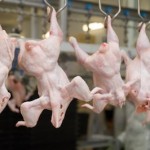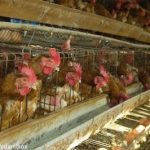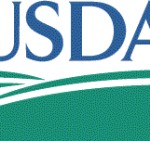A new study published in the Journal Infection Control and Hospital Epidemiology found that kitchen cutting boards can become contaminated with antibiotic-resistant bacteria from raw meat. Researchers at the University Hospital in Basel, Switzerland looked at 154 cutting boards before they were washed from the hospital and 44 from private homes after they were used to prepare pork, beef, veal, lamb, game, or fish. In addition, kitchen gloves worn during meat preparation were tested. The scientists discovered that 6.5% of the hospital cutting boards and 3.5% of the household cutting boards used to prepare poultry tested positive for "multidrug-resistant E. coli bacteria." None of the boards used for meat other than poultry dated positive. Fifty percent of the gloves were contaminated … [Read more...]
Denmark Successfully Controls Salmonella in Poultry
An article in the Oregonian details how Denmark started an intensive effort twenty years ago to try to control Salmonella infections in poultry after an increase in human illness. In the U.S., at least 200,000 people are sickened ever year by Salmonella in poultry. The USDA launched a Salmonella Action Plan last year that has been widely criticized because it just controls contamination during poultry processing. Meanwhile, Denmark has practically eradicated Salmonella in chicken. There is zero tolerance for Salmonella bacteria in poultry in Denmark. In the U.S., Salmonella contamination is accepted as a given. The huge Foster Farms chicken Salmonella outbreak from early 2013 through this year, which has sickened at least 14,000 consumers and hospitalized hundreds, is considered … [Read more...]
Legislators Angry About Increased Poultry Line Speeds
According to Food and Water Watch, congressional leaders and poultry workers have asked the Obama administration to stop the USDA from letting poultry plants increase line speeds. The new regulations, which were announced two years ago, will increase line speeds from 140 birds per minute to 175, despite a lot of evidence that this speed is a primary contributor to worker injuries. OSHA does not regulate line speeds or enforce safety rules for poultry plants; the USDA is the only federal agency involved in this area. The coalition, which includes Center for Effective Government and Center for Progressive Reform, is also stating that this increase will make workers less able to identify and remove tainted chicken. Hilary O. Shelton, director of the NAACP Washington Bureau said in a … [Read more...]
Food & Water Watch Targets Maryland Poultry Industry Polluters
Food & Water Watch is targeting poultry industries in Maryland that contribute to nutrient pollution in the Chesapeake Bay. Legislation introduced by Senator Richard Madaleno (D-18) and Delegate Shane Robinson (D-39), called the Poultry Fair Share Act, would hold Maryland's big poultry companies partially accountable for cleanup. Water quality in the Chesapeake Bay watershed has declined in recent years. Factory poultry farms on Maryland's Eastern Shore make a billion and a half pounds of waste every year. Contract growers are forced to dump excess chicken manure on saturated farm fields because these companies will not handle the waste themselves. Runoff ends up in the Bay and its tributaries. Food Poisoning Bulletin told you about this problem last month. Phosphorous pollution … [Read more...]
Congress to USDA: No Chinese Chicken in School Lunches
Several members of Congress have sent a letter to ranking members of the Senator and House Committee on Appropriations and Agriculture, telling them that chicken processed in China and exported to the U.S. should not be served in school lunches. The letter was sent to Senators Mark Pryor (D-AR), Roy Blunt (R-MO), and Congressmen Robert Aderholt (R-AL) and Sam Farr (D-CA). Those members of Congress are concerned about the problem with food safety in China. They also believe FSIS will eventually let China export raw chicken to the U.S. They are asking that language in the Fiscal Year 2014 Agriculture Appropriations Bill should ensure that Chinese-processed chicken will not be included in the National School Lunch Program and other federal food programs, and that no funds should be used … [Read more...]
ASPCA Requests National Chicken Council Update Guidelines
The American Society for the Prevention of Cruelty to Animals (ASPCA) has sent a letter to the National Chicken Council (NCC), asking them to update guidelines for humane handling and living conditions for chickens. They say that "current unprecedented growth rates and standard living conditions of chickens not only pose serious concerns for their welfare, but may also present food safety risks." A report from May 2011 by the Humane Society of the United States found that sixteen scientific studies showed hens confined in cages had higher rates of Salmonella, the leading cause of food poisoning related deaths in the United States. A European Food Safety Authority analysis found 43% lower odds of Salmonella contamination in cage-free barns. Free-range birds had 98% lower chance of … [Read more...]
USDA Says Jury Still Out on Poultry Slaughtered in China
Sen. Charles Schumer (D-NY) has hit the panic button on poultry from China too early, says the U.S. Department of Agriculture's Food Safety and Inspection Service (USDA- FSIS). Poultry slaughtered in China is not currently allowed for sale in the U.S., but if it were to receive approval it would meet U.S. food safety standards, the agency said in a rare clarification issued this weekend in response to Schumer's comments. Poultry slaughtered in China is not currently allowed for sale in the U.S. But, said Schumer on Sunday, the USDA is getting ready to approve it. In 2010, China asked the USDA to review its poultry slaughter methods. FSIS must review such requests from foreign countries. But, in this case, the agency has not finalized the audit or released preliminary results. "If … [Read more...]
Study Finds Kosher Chickens Have More Antibiotic-Resistant E. coli
A new study published in F1000Research and funded by Northern Arizona University has found that kosher chickens contain more antibiotic-E. coli bacteria. Scientists could not explain why kosher chickens had the highest level, which organic chicken had antibiotic-resistant bacterial levels just as high as conventionally raised chickens. Only chickens that were raised without antibiotics (RWA) had lower levels of antibiotic-resistant E. coli. But they still contained antibiotic-resistant bacteria. Scientists purchased 213 samples of raw chicken from 15 locations in New York City from April through June 2012. They screened generic E. coli isolates from each sample for resistance to 12 antibiotics and did not assess virulence for each sample. Kosher chicken had the highest frequently of … [Read more...]
AMI Foundation Produces Video on Proper Thermometer Use
The American Meat Institute (AMI) Foundation has produced a new video for September's National Food Safety Education Month that shows how to properly use a thermometer to check the temperature in meat and poultry products. Research has shown that only 36% of Americans use a thermometer to make sure the meat and poultry they cook is safe. AMI Foundation Chief Scientist Dr. Betsy Booren said, "people often believe they can tell when meat or poultry is cooked by looking at the color or by touching it, but using a thermometer is the only way to truly ensure safety. It's an easy step to take when cooking that can make a significant difference." The video tells you about the recommended final internal temperature for different products. Poultry, whether whole cuts or ground, should be … [Read more...]
Gillibrand Introduces Meat and Poultry Safety Bill
U.S. Senator Kirsten Gillibrand (D-NY) has introduced the Safe Meat and Poultry Act which aims to strengthen the country’s meat and poultry inspection system and reduce the number of foodborne illness outbreaks. Gillibrand, who is chairwoman of the Agriculture Subcommittee on Livestock, Dairy, Poultry, Marketing and Agriculture Security, said the financial and public health toll these outbreaks have has been exacerbated by the fact that food safety legislation affecting the U.S. Department of Agriculture has not been upgraded in more than a century. One in six Americans are sickened by food poisoning each year, according to the Centers for Disease Control and Prevention (CDC). The public health and economic cost of these illnesses is over $14 billion each year, according to the … [Read more...]












